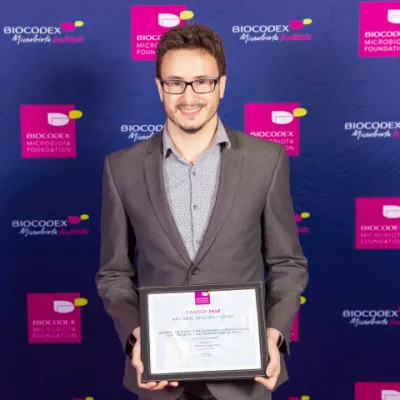
Project description
News from Dr. Charlène Roussel
Introduce yourself, your research project and your experience with the Microbiota Grant
I am a newly appointed Assistant Professor within the School of Pharmaceutical Sciences at the University of Ottawa. I completed my joint Ph.D. in Microbiology and Applied biological sciences at Gent University (Belgium) and Clermont-Auvergne University (France). I did my postdoc in Microbial ecology and fermentation system at the Institute of Nutrition and Functional Foods (INAF, Québec City) under the Canada Excellence Research Chair on the microbiome-endocannabinoidome axis in metabolic health. My research lab, which I am currently establishing, is a cross-disciplinary group aiming to incorporate in vivo and ex vivo techniques to replicate critical ecosystems for microbial interactions with the overarching goal of enhancing human health. Specifically, one of my focus lies in women's health research.
What inspired you to pursue this specific research project?
The inspiration behind my research stems from the pressing need to address the challenges faced by early adulthood women (18-40) who experience recurrent urinary tract infections (UTIs). While advancements have been made in treating midlife postmenopausal women (50+) with UTIs through the use of vaginal estrogen, the situation remains challenging for younger women. Current treatment options for this group are limited and primarily rely on antibiotics.
The inadequacy of these treatments is rooted in our limited understanding of the ecology and pathogenesis of uropathogenic Escherichia coli (UPEC) across different body environments. Traditionally, research has focused on the urinary tract and bladder cells as the primary action sites, overlooking the significance of the gut microbial ecosystem, the vaginal microbiome, and the urobiome, which serve as transitory niches for UPEC.
Our research proposes a novel approach that embraces a more holistic view of these ecosystems and their role in UPEC's pathogenesis.
What does Biocodex Microbiota Foundation national grant mean to you? What impact could the results of your study have on clinical practice? In what ways do you envision your work influencing the microbiota-related research in the future?
The acquisition of the grant is pivotal for the establishment of my own laboratory and the advancement of my career as a young researcher. The experimental pipeline I am developing holds the promise of serving as a preclinical validation platform for a diverse array of therapeutic strategies, including probiotics. We ultimately aim to develop more effective strategies for preventing and treating UTIs in early adulthood women. Moreover, this experimental pipeline facilitate the study of other pathogenic agents.
Canada's winning projects


Stress-Microbiota-Stem Cell Axis Disruption in Intestinal Epithelial Dysfunction and Therapeutic Restoration


Painful autoantibody cross-reactivity with the gut microbiome in fibromyalgia


Evolution of the intestinal microbiome, inflammatory markers, and body composition across lactation stages in infants born to women with normal weight and overweight/obesity


Does immunosuppression contribute to metabolic syndrome via the intestinale microbiome?


Influence of hyperglycemia on the host-microbiome interactions during subgingival microbiome dysbiosis


Role of mucin-type O-glycans in regulating commensal vs. pathologic functions of Prevotella species in IBD


Determine the effect of pre-CD microbiota on physiological responses in the T-cell transfer model of colitis


The role of commensal microbiota on dietary tryptophan metabolism: Implications for inflammatory bowel disease

